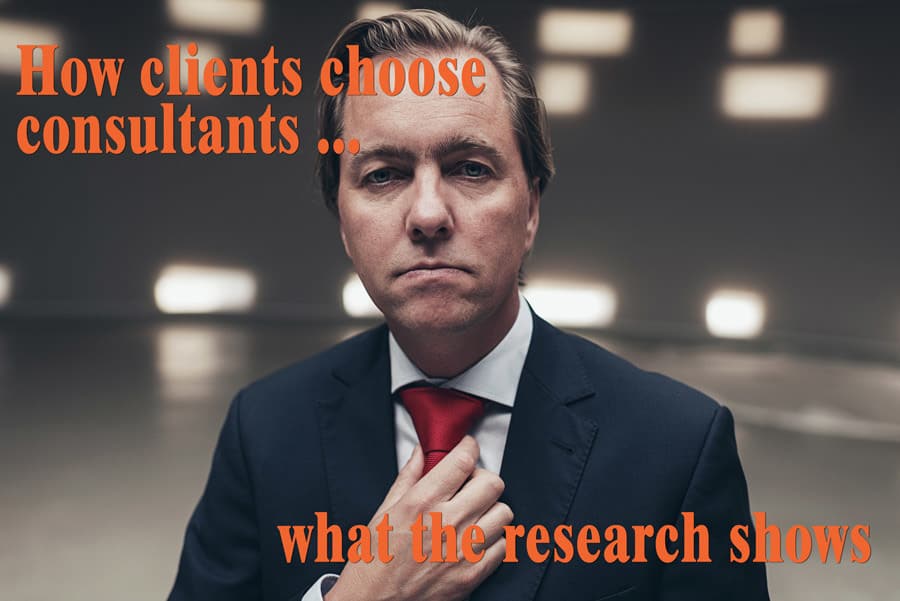- in Blog , Evidence-Based Practice , Research by David Wilkinson
- |
- 2 comments
How clients choose management consultants – what the research shows

How do organisations and clients choose a management consultant to work with them?
What criteria and what decision-making processes organisations use to choose consultants is an important question for both organisations and consultants / consultancies. Looking at the current research provides a useful evidence-based overview of the nature of the problem faced by organisations when deciding whether or not to call in external expertise and help and how they go about making the choice between the huge array of consultants and consultancies available in the market.
Contents:
- The numbers are stacked against you – but fear not
- Why organisations recruit management consultants
- The 8 most utilised consultancy services
- The 8 reasons why organisations engage consultants – in order of frequency
- Types of procedures for engaging consultants
- What organisations think they are buying
- The process of deciding to use a management consultant
- The six factors of perceived consultancy performance
- How experts and consultants gain influence when they have little power
- The main problems of being a peripheral expert or consultant
- Conflict points
- Results – gaining influence as an outsider
- Conclusion
- References
The numbers are stacked against you – but fear not
If you are a management consultant or consultancy you are one of over 13,700,000 management consultants[1] listed on LinkedIn:
If you are a Management Development Consultant, you are one of over 8.5 million[2] management development consultants listed on LinkedIn
From a potential client’s perspective these figures alone present an obvious problem…. But we are getting ahead of ourselves. In this special post I will look how the research shines a light on the processes organisations go through to choose a management consultant, what criteria they use and what consultants, especially management consultants can do to give themselves the best chance in a very crowded market.
Done properly even a small consultancy or individual management consultant can take on the bigger players in the industry. You just need to know:
- What processes organisations go through to arrive at the decision they need a consultant in the first place
- What they are really looking for
- What they want from you
- What criteria they use
- How they choose the consultant they do out of the millions available around the world
- How the bigger players smooze their way in
- How to position yourself
Why organisations recruit management consultants
The first issue organisations face is the decision to involve an external consultant. What is it that prompts an organisation to outsource services, knowledge and skills?
There are considered to be two primary reasons why organisations reach for consultants, which occur when:
- Technological advancements require specialised knowledge and skills often not initially available within an organisation.[3]
- There is an organisational focus on core competencies and business, whereby the organisation concentrates on building expertise in its primary area of business and regularly outsources temporary adjunct needs. This provides greater levels of organisational flexibility and speed of response to market movements.[4]
The 8 most utilised consultancy services
Previous studies[5] found that there are eight consultancy elements that tend to get utilised by organisations:
- Specialist knowhow, experience, methods etc.
- Particular individual professionals or gurus.
- That they have access to specialist resources or other attributes.
- Diagnosis, problem formulation, or strategy formulation services
- Experience of a particular methodology.
- Pre-existing solution to a specific problem.
- Knowledge, skills and experience of implementing a particular solution.
- Ability to analyse, evaluate or capitalise on the results of a solution.
The 8 reasons why organisations engage consultants – in order of frequency
Further, it has been found[6] that, from an organisational perspective, consultants and consultancies tend provide eight specific services to organisations (in order of frequency of reason for recruitment):
- Providing information and expertise to the client.
- Solving a client’s specific problem or problems.
- Diagnosis of a problem (and redefinition of the problem).
- Making recommendations based on a diagnosis.
- Assisting with the implementation of solutions.
- Building a commitment, engagement and consensus for a particular course of action (often corrective).
- Developing and facilitating client/organisational learning – helping the client to learn to resolve a particular problem in the future.
- Helping to improve organisational effectiveness.
It should be noted that these are all activity-based services, as opposed to product based.
Types of procedures for engaging consultants
A further study[7] found that there are three primary ways organisations engage consultants:
- Laissez faire.
- Organised decentralisation.
- Expert strategy.
For a complete look at these procedures and the complete report click here to download the complete report: How clients choose consultants – what the research shows
99% of everything you are trying to do...

...has already been done by someone else, somewhere - and meticulously researched.
Get the latest research briefings, infographics and more from The Oxford Review - Free.
What organisations think they are buying
Studies, including a 2019 meta-analysis of recent research,[8] found that organisations are looking for, and expect, expertise and bespoke and customised services and solutions to their issues, which is the main motivating factor in engaging any particular consultant or consultancy. However, what the research also found was that what consultants and consultancies actually provide is often a form of routinised knowledge dressed up as cutting edge, innovative and based on proper research – when it usually isn’t.[9]
This lack of research/evidence-based practice[10] among many (but not all) consultants shows itself in the range of fads, fashions, hype and home spun theories that constantly proliferate industry few of which are based on anything more than an opportunity survey. Even the guru’s like Jim Collins who push ideologies (and books) like “Good to Great” are often based on nothing more that generalised observations[11] rather than specifics and good research.
Coupled with constant change agenda which [12] is pushed and amplified by many consultants, it is easy to see how organisations get taken in by slick marketing and sales techniques.
The process of deciding to use a management consultant
A series of studies[13] found that organisations typically go through a sequence of steps whilst deciding and engaging with consultants:
- Pre-stage. This is the time before a decision has been made and before there is an awareness of an issue that the organisation may need help with. In this stage it is business as usual.
- This is the stage at which there is a realisation that there is a problem that needs to be resolved. This can occur internally or a problem they didn’t hitherto know they had can be identified by some external source, like a magazine article, consultant or other source.
- Problem formulation. At this stage, there is an articulation and re-articulation of the issue or problem and the problem becomes defined and enters the formal consciousness of the organisation as a ‘thing’.
- Identification of alternatives. It is at this stage that the organisation starts to look for ways to deal with and resolve the problem. It is now that the potential for a consultant to be used arises, amongst other alternatives, like using inhouse resources, research etc.
- Selection and decision-making phase. This is the point at which the organisation decides what process it will try in order to deal with the issue. Consultants may be the first choice, particularly where specialised knowledge, expertise or experience is needed, or where the organisation decides to use a temporary process whilst it focuses on the core business. Alternatively, consultants may end up as the choice when other alternatives have failed to solve the issue satisfactorily.
- Research phase. Having decided to choose the route of a consultant, this is the stage during which the organisation tries to identify a range of alternative consultants or consultancies that will best fit its needs.
- Evaluation of the consequences. The study found that, rather than evaluating the services and outcomes promised by their shortlisted consultants or consultancies and their services, organisations tend to evaluate the consequences of engaging each alternative service. For example, price, reputation, time it will take, etc. This is a risk mitigation exercise in an ambiguous and uncertain space. One study[14] found that only 50% of organisations have any formal criteria or process for this evaluation.
- It was found that the final decision made was done less on criteria and more in terms of which offering provides the greatest level of certainty. The final decision is an exercise of decision-making under high levels of ambiguity and uncertainty, and safety is often the prime motivator.
- This is the phase during which the consultant/consultancy first engages with the project. Whilst organisations are often engaged in a process of continual evaluation of fit with expectations and need, there is initially a form of confirmation bias (to prove they made the right decision) that protects the consultant/consultancy in the early days. However, gross mismatches in need and expectation can result in premature termination of the contract.
- Post-stage. Dependant on how the relationship has been managed and whether expectations have been properly managed and met, further engagement may be possible.
Part of the problem is that there an asymmetry of information and considerable levels of uncertainty when it comes to choosing consultants. Clients usually have little objective data on whether the potential consultant/consultancy can do what they say and have the expertise they claim[15].
One of the main impacts this client uncertainty has on the process of engaging a consultant/consultancy is to look for markers or indicators of expertise.
One of the main impacts this client uncertainty has on the process of engaging a consultant/consultancy is to look for markers or indicators of expertise.
The six factors of perceived consultancy performance
A 2016 study[16] examined 255 management consultancy firms and their clients’ perceptions of success/credibility and found that six factors had a significant impact on perceptions of performance:
- Consultant expertise
- Intensity of collaboration
- Common vision
- –
- –
- –
For the
Of these, the following three factors were found to have the most influence on clients’ buying/engagement behaviour:
For a complete list of these factors and the complete report and references click here to download the complete report: How clients choose consultants – what the research shows
Consultants expertise
A range of studies[17] have found that one of the major influences on client opinions is the perception of the consultant’s expertise. A 2015 study[18] found the range of indicators of expertise include:
- Knowledge of the topic
- Analytical skills
- Specialist knowledge of the latest research findings
- Previous experience of similar projects and in similar industries
- Knowledge of the industry
- Know-how – the ability to translate research into practice
- Knowledge flexibility – the ability to deal with changing realities
- Previous successes
- The ability to see inconsistencies
- Billing rate. The higher the billing rate, the greater the expertise assumed.
Intensity of collaboration
Common vision
For a complete list of these factors and the complete report and references click here to download the complete report: How clients choose consultants – what the research shows
How experts and consultants gain influence when they have little power
The main problems of being a peripheral expert or consultant
Conflict points
Results – gaining influence as an outsider
For the complete report and references click here to download the complete report: How clients choose consultants – what the research shows
Conclusion
A 2018 study,[19] however, found that the cost of the use of management consultants (in public service organisations) “is not statistically associated with improvements in efficiency”. In particular, the study found that the use of management consultants frequently has a negative impact on operational efficiency and adjusted costs. This the researchers put down to “high prices, the incompetence of management consultants or the poor quality of their products, over-consumption of their services, and associated levels of disruption”.
As noted above, a number of studies[20] have shown that many consultants and consultancies are adept at dressing up ‘routinised’ and ‘popular’ knowledge as cutting edge, innovative and research / evidence-based, when often it isn’t.
There have been a number of calls[21] for consultants and organisations to make better use of the available mass of research evidence in their practice and that this, given what organisations want and think they are buying (expertise) is a key source of competitive advantage and aid to positioning in the market[22].
In short:
- Clients want evidence and research-based solutions that apply to their situation, there is ample evidence for this.
- Clients want to reduce risk; they want solutions that work. There is evidence for this.
- They want and think they are buying expertise and not just experience, again there is evidence for this statement.
- Necessarily an expert will be up to date with the most recent research and thinking. This means that consultants and their clients need to know and understand what the research actually says, which of it is generalisable and what its limitations are[23].
The problem is it is often difficult for clients/organisations to see through the hype and marketing speak in what is essentially a ‘marketplace for ideas’[24] to see which consultancies and consultants that are genuinely research / evidence based.
References
[1] Search LinkedIn www.linkedin.com date accessed 14.10.19
[2] Search LinkedIn www.linkedin.com date accessed 14.10.19
[3] Edvardsson, B. (1990). Management consulting: Towards a successful relationship. International Journal of Service Industry Management, 1(3), 4-19.
[4] Werr, A., & Pemer, F. (2007). Purchasing management consulting services—From management autonomy to purchasing involvement. Journal of Purchasing and Supply Management, 13(2), 98-112.
[5] Onkvisit, S., & Shaw, J. J. (1991). MARKETING THEORIES, MODELS AND GENERAL ISSUES: Is Services Marketing” Really” Different?. Journal of Professional Services Marketing, 7(2), 3-17.
[6] Turner, A. N. (1982). Consulting is more than giving advice. Harvard business review, 60(5), 120-129.
[7] Werr, A., & Pemer, F. (2005). Purchasing management consultants-from personal ties to organizational procedures. In Academy of Management Proceedings (Vol. 2005, No. 1, pp. B1-B6). Briarcliff Manor, NY 10510: Academy of Management.
[8] Shaw, D. (2019). Partners and plagiarisers: Dualities in consultants’ influence on organisational change projects. Journal of Organizational Change Management, 32(1), 51-66.
Edvardsson, B. (1990). Management consulting: Towards a successful relationship. International Journal of Service Industry Management, 1(3), 4-19.
[9] See also the Oxford Review briefing “The Problem with Management Consultants” (2019) available to members in the library.
[10] Barends, E., Villenueva, J., Briner, R. B., & ten Have, S. (2015). Managers’ attitudes and perceived barriers to evidence-based management an international survey. In search of evidence, 143e179.
[11] Barends, E., (2015). Managers’ attitudes and perceived barriers to evidence-based management an international survey. In search of evidence, 143e179. Doctoral Thesis
[12] Sorge, A., & Van Witteloostuijn, A. (2004). The (non) sense of organizational change: An essai about universal management hypes, sick consultancy metaphors, and healthy organization theories. Organization Studies, 25(7), 1205-1231.
[13] Lovelock, C., & Gummesson, E. (2004). Whither services marketing? In search of a new paradigm and fresh perspectives. Journal of service research, 7(1), 20-41.
Gummesson, E. (2011). Total relationship marketing. Routledge.
Gummesson, E. (1987). The new marketing—developing long-term interactive relationships. Long range planning, 20(4), 10-20.
Gummesson, E. (2002). Relationship marketing in the new economy. Journal of relationship marketing, 1(1), 37-57
[14] Werr, A., & Pemer, F. (2005, August). Purchasing management consultants-from personal ties to organizational procedures. In Academy of Management Proceedings (Vol. 2005, No. 1, pp. B1-B6). Briarcliff Manor, NY 10510: Academy of Management.
[15] Clark, T. A. R. (1995). The impact of buyer uncertainty on the selection of executive recruitment consultancies. International Journal of Selection and Assessment, 3(1), 41.
[16] Bronnenmayer, M., Wirtz, B. W., & Göttel, V. (2016). Success factors of management consulting. Review of Managerial Science, 10(1), 1-34.
[17] Morris, T., & Empson, L. (1998). Organisation and expertise: An exploration of knowledge bases and the management of accounting and consulting firms. Accounting, Organizations and Society, 23(5-6), 609-624.
Thong, J. Y., Yap, C. S., & Raman, K. S. (1996). Top management support, external expertise and information systems implementation in small businesses. Information systems research, 7(2), 248-267.
Ifinedo, P. (2008). Impacts of business vision, top management support, and external expertise on ERP success. Business Process Management Journal, 14(4), 551-568.
Brandon-Jones, A., Lewis, M., Verma, R., & Walsman, M. C. (2016). Examining the characteristics and managerial challenges of professional services: An empirical study of management consultancy in the travel, tourism, and hospitality sector. Journal of operations management, 42, 9-24.
Ferguson, M. (2019). The rise of management consulting in Britain. Routledge.
[18] Bouwmeester, O., & Stiekema, J. (2015). The paradoxical image of consultant expertise: A rhetorical deconstruction. Management Decision, 53(10), 2433-2456.
[19] Kirkpatrick, I., Sturdy, A. J., Alvarado, N. R., Blanco-Oliver, A., & Veronesi, G. (2019). The impact of management consultants on public service efficiency. Policy & Politics, 47(1), 77-96.
[20] Shaw, D. (2019). Partners and plagiarisers: Dualities in consultants’ influence on organisational change projects. Journal of Organizational Change Management, 32(1), 51-66.
[21] Sorge, A., & Van Witteloostuijn, A. (2004). The (non) sense of organizational change: An essai about universal management hypes, sick consultancy metaphors, and healthy organization theories. Organization Studies, 25(7), 1205-1231.
Barends, E., (2015). Managers’ attitudes and perceived barriers to evidence-based management an international survey. In search of evidence, 143e179.
Edvardsson, B. (1990). Management consulting: Towards a successful relationship. International Journal of Service Industry Management, 1(3), 4-19.
See also the Oxford Review briefing “The Problem with Management Consultants” (2019) available to members in the library.
[22] Noe, R. A., Hollenbeck, J. R., Gerhart, B., & Wright, P. M. (2017). Human resource management: Gaining a competitive advantage. New York, NY: McGraw-Hill Education.
[23] Campbell. R. (2019) Scientists in Every Boardroom: Harnessing the Power of STEMM Leaders in an Irrational World. Book in print
King, W. R., Grover, V., & Hufnagel, E. H. (1989). Using information and information technology for sustainable competitive advantage: some empirical evidence. Information & Management, 17(2), 87-93.
[24] Cascio, W. F. (2007). Evidence-based management and the marketplace for ideas. Academy of management journal, 50(5), 1009-1012.





3compliance
Business management consultant do be a Very Good Idea for Small Businesses. Although the initial expense may seem high, hiring a consultant can prove to be very beneficial as they are usually experts in their field. If a business owner wants to get advice on many different aspects of their business, it is a good idea to discuss the possibility of hiring a consultant with their immediate family and friends.
Visit: https://www.beqbe.com/p/businessmanagementconsultant